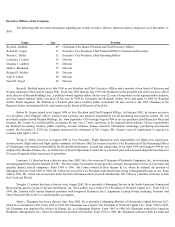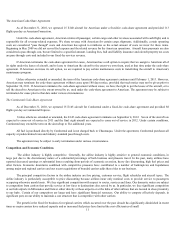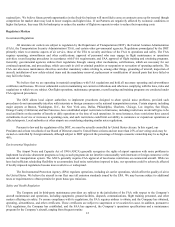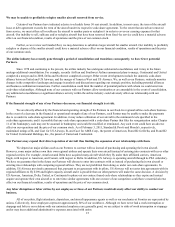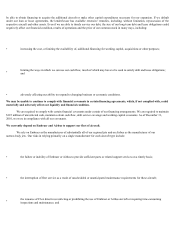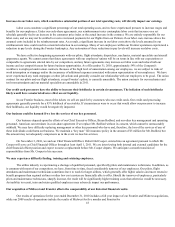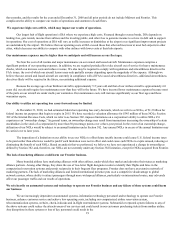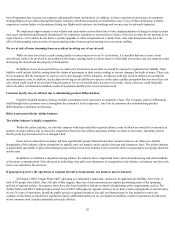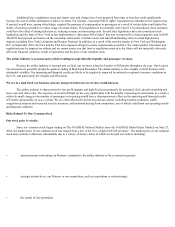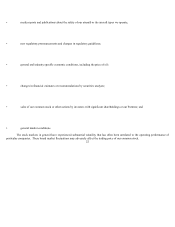Frontier Airlines 2010 Annual Report Download - page 21
Download and view the complete annual report
Please find page 21 of the 2010 Frontier Airlines annual report below. You can navigate through the pages in the report by either clicking on the pages listed below, or by using the keyword search tool below to find specific information within the annual report.Frontier operations. In addition, larger airlines may have a competitive advantage because they pay lower prices for fuel, and other airlines,
such as Southwest Airlines, may have substantial fuel hedges that give them a competitive advantage. Because fuel costs are now a
significant portion of our operating costs, substantial changes in fuel costs can materially affect our operating results and/or cause us to
reduce our scheduled operations at Frontier. Fuel prices continue to be susceptible to, among other factors, speculative trading in the
commodities market, political unrest in various parts of the world, Organization of Petroleum Exporting Countries policy, the rapid growth of
economies in China and India, the levels of inventory carried by the oil companies, the amount of reserves built by governments, refining
capacity, and weather. These and other factors that impact the global supply and demand for aircraft fuel may affect our financial
performance due to its high sensitivity to fuel prices. A one-cent change in the cost of each gallon of fuel would impact our pre-tax income by
approximately $2.3 million per year based on our current fleet and aircraft fuel consumption.
Since the acquisitions of Midwest and Frontier, fuel has become a major component of our operating expenses, accounting for
24.4% of our total operating expenses for the year ended December 31, 2010. Our ability to pass on increased fuel costs has been and may
continue to be limited by economic and competitive conditions.
We depend heavily on the Denver and Milwaukee markets to be successful.
Our business strategy for Frontier is focused on adding flights to and from our Denver and Milwaukee bases of operations. As of
December 31, 2010, 95% of our flights originate or depart from Denver International Airport, known as DIA, and General Mitchell
International Airport in Milwaukee, known as MKE (this does not include seasonal non-hub flying to Mexico). A reduction in our share of
either market, increased competition, or reduced passenger traffic to or from or through Denver or Milwaukee could have an adverse effect
on our financial condition and results of operations. In addition, our dependence on a hub system operating out of DIA makes us more
susceptible to adverse weather conditions and other traffic delays in the Rocky Mountain region than some of our competitors that may be
better able to spread these traffic risks over larger route networks.
We face intense competition by United Airlines, Southwest Airlines and other airlines at DIA and by AirTran, Southwest Airlines,
and Delta Air Lines at MKE.
The airline industry is highly competitive. We compete with United in our hub in Denver, and we anticipate that we will compete
with United in any additional markets we elect to serve in the future. United and United's regional airline affiliates are the dominant carriers
out of DIA. In addition, Southwest Airlines started service to and from Denver in January 2006 and has grown significantly since then to
become the third largest carrier at DIA. Southwest pricing has caused downward pressure on Frontier yields and any future Southwest
exposure may place further downward pressure
on our revenue. Fare wars, predatory pricing, and “capacity dumping,” in which a competitor places additional aircraft on selected routes, and
other competitive activities could adversely affect us. In Milwaukee, although Frontier is the largest carrier, we face competition from
AirTran, Southwest Airlines, and Delta Air Lines. In addition, AirTran and Southwest Airlines have recently announced plans to merge,
which may change the competitive landscape in DIA and MKE. The future activities of competing branded carriers in DIA, MKE and any
other focus city from which we operate may have a material adverse effect on our revenue and results of operations.
Our fixed-fee business is dependent on our code-share relationships with our Partners.
We depend on relationships created by our regional jet fixed-fee code-share agreements with American, Continental, Delta, United
and US Airways for all of our fixed-fee service revenues. Any material modification to, or termination of, our code-share agreements with
any of these Partners could have a material adverse effect on our financial condition, results of our operations and the price of our common
stock. Each of the code-share agreements contains a number of grounds for termination by our Partners, including our failure to meet
specified performance levels.
In addition, because all of our fixed-fee service revenues are currently generated under the code-share agreements, if any one of
them is terminated, we cannot assure you that we would be able to enter into substitute code-share arrangements, that any such substitute
arrangements would be as favorable to us as the current code-share agreements or that we could successfully utilize those aircraft in our
branded operations.
Our customers may react negatively to the consolidation of our branded service under the “Frontier” name.
As we move toward a unified branded operation, there may be customer dissatisfaction with the branding direction taken by us.
Additionally, customers in certain markets may not respond positively or recognize the Frontier brand.
14




